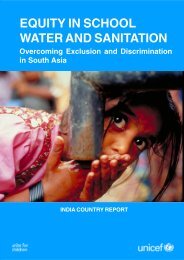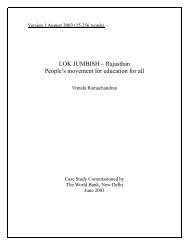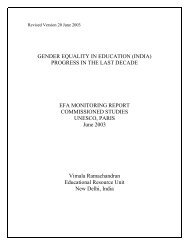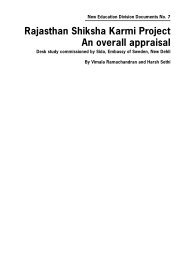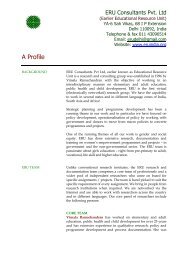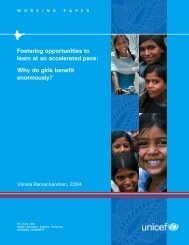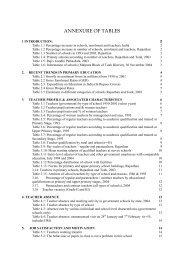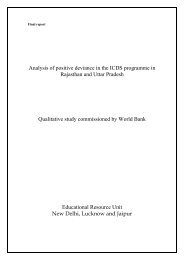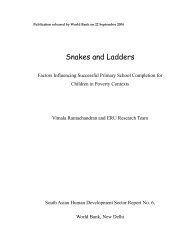primary school teachers the twists and turns of everyday practice
primary school teachers the twists and turns of everyday practice
primary school teachers the twists and turns of everyday practice
Create successful ePaper yourself
Turn your PDF publications into a flip-book with our unique Google optimized e-Paper software.
Version 20 Oct 08, edited final<br />
(Kingdon 1996). Fur<strong>the</strong>r, <strong>the</strong> automatic pass procedure in <strong>primary</strong> <strong>school</strong>s in many<br />
states means that <strong>the</strong>re is no systematic way <strong>of</strong> evaluating student learning, let alone<br />
linking it to <strong>teachers</strong>’ performance.<br />
At <strong>the</strong> same time, a multiplicity <strong>of</strong> factors act as disincentives by actively<br />
discouraging <strong>teachers</strong> from developing or adopting creative teaching <strong>practice</strong>s. Two<br />
<strong>of</strong> <strong>the</strong>se have already been discussed above: training methodologies that discourage<br />
questioning, discussion <strong>and</strong> analysis by <strong>teachers</strong>, expecting <strong>the</strong>m to apply training<br />
content exactly as <strong>the</strong>y received it ra<strong>the</strong>r than adapting it to <strong>the</strong> needs <strong>of</strong> specific<br />
learners; <strong>and</strong> a supervisory system focused on collection <strong>of</strong> administrative data <strong>and</strong><br />
on ensuring that <strong>school</strong>s <strong>and</strong> <strong>school</strong> personnel conform to st<strong>and</strong>ards <strong>and</strong> procedures<br />
developed elsewhere. An additional powerful disincentive is created by <strong>the</strong> informal<br />
system <strong>of</strong> patronage <strong>and</strong> rent-seeking in operation throughout <strong>the</strong> educational<br />
system, which obliges <strong>teachers</strong>, willingly or unwillingly, to dedicate time <strong>and</strong> effort<br />
to keep local politicians <strong>and</strong> elites happy, given that <strong>the</strong>y control <strong>the</strong> limited rewards<br />
obtainable within <strong>the</strong> system—in particular, transfers to desired locations.<br />
Accountability<br />
To whom, <strong>the</strong>n, are elementary <strong>school</strong> <strong>teachers</strong> accountable for <strong>the</strong> quality <strong>of</strong><br />
learning outcomes? That is, who within <strong>the</strong> system has <strong>the</strong> authority <strong>and</strong> <strong>the</strong> ability<br />
to define what constitutes good teaching <strong>practice</strong>, evaluate whe<strong>the</strong>r <strong>teachers</strong> are<br />
doing a good job, reward those who are, <strong>and</strong> sanction those who are not? The short<br />
answer to this question is: nobody.<br />
‘Good teaching <strong>practice</strong>’ is not evaluated in <strong>primary</strong> <strong>school</strong>s in India: conformity to<br />
rules <strong>and</strong> regulations entirely unrelated to student learning is.<br />
Within <strong>the</strong> <strong>school</strong>, head <strong>teachers</strong>—where <strong>the</strong>se exist—exert limited authority over<br />
<strong>teachers</strong>, since promotions, transfers <strong>and</strong> o<strong>the</strong>r decisions are taken elsewhere.<br />
Supervisory personnel are confined primarily to administrative inspections <strong>and</strong>, as<br />
we have seen, have been known to exert a negative influence on innovative teaching<br />
<strong>practice</strong>. Local communities do not have <strong>the</strong> skills to undertake this kind <strong>of</strong><br />
pr<strong>of</strong>essional evaluation <strong>of</strong> <strong>teachers</strong>. District education authorities <strong>of</strong>ten operate on<br />
<strong>the</strong> basis <strong>of</strong> political or administrative, ra<strong>the</strong>r than educational, criteria.<br />
Autonomy<br />
Teacher autonomy <strong>and</strong> accountability are in many ways two sides <strong>of</strong> <strong>the</strong> same coin.<br />
Whereas accountability looks at whom <strong>teachers</strong> answer to in terms <strong>of</strong> <strong>the</strong> quality <strong>of</strong><br />
<strong>the</strong>ir pr<strong>of</strong>essional performance, autonomy identifies <strong>the</strong> ways in which <strong>teachers</strong><br />
<strong>the</strong>mselves have <strong>the</strong> flexibility to adapt what <strong>the</strong>y do in <strong>the</strong> classroom to <strong>the</strong> specific<br />
needs <strong>and</strong> context <strong>of</strong> <strong>the</strong>ir students. We have seen in <strong>the</strong> earlier chapters <strong>of</strong> this<br />
booklet that <strong>teachers</strong> are not expected to exercise <strong>the</strong>ir own judgement in<br />
determining how best to teach: since both content <strong>and</strong> instructional methods are<br />
defined elsewhere, attempts to deviate from <strong>the</strong>se are actively discouraged. Teachers<br />
are expected to utilise innovations developed at higher levels <strong>of</strong> <strong>the</strong> system,<br />
regardless <strong>of</strong> practical constraints on <strong>the</strong>ir implementation.<br />
The attempt to reduce <strong>the</strong> educational experience (today acknowledged, at least in<br />
<strong>the</strong>ory, to be an interactive process, ra<strong>the</strong>r than <strong>the</strong> mechanical transmission <strong>of</strong><br />
knowledge) to <strong>the</strong> availability <strong>of</strong> a ‘least common denominator’ series <strong>of</strong> predefined<br />
inputs, regardless <strong>of</strong> context, does not, however, guarantee a minimum level <strong>of</strong><br />
67



